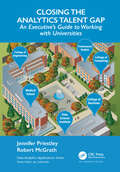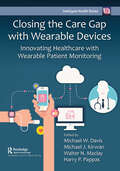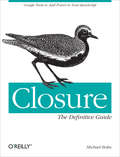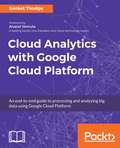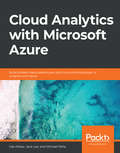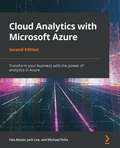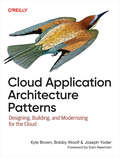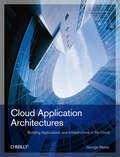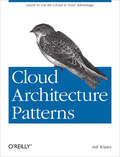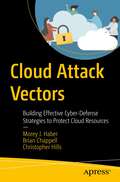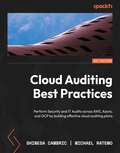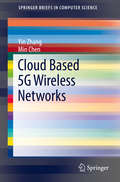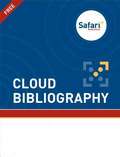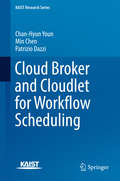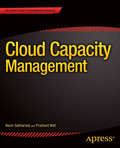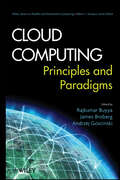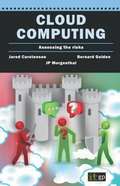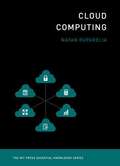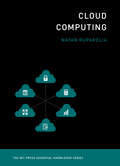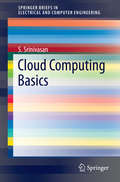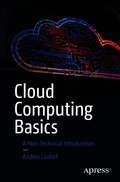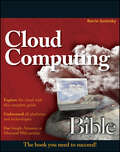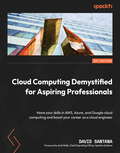- Table View
- List View
Closing the Analytics Talent Gap: An Executive's Guide to Working with Universities (Data Analytics Applications)
by Jennifer Priestley Robert McGrathHow can we recruit out of your program? We have a project – how do we reach out to your students? If we do research together who owns it? We have employees who need to "upskill" in analytics – can you help me with that? How much does all of this cost? Managers and executives are increasingly asking university professors such questions as they deal with a critical shortage of skilled data analysts. At the same time, academics are asking such questions as: How can I bring a "real" analytical project in the classroom? How can I get "real" data to help my students develop the skills necessary to be a "data scientist? Is what I am teaching in the classroom aligned with the demands of the market for analytical talent? After spending several years answering almost daily e-mails and telephone calls from business managers asking for staffing help and aiding fellow academics with their analytics teaching needs, Dr. Jennifer Priestley of Kennesaw State University and Dr. Robert McGrath of the University of New Hampshire wrote Closing the Analytics Talent Gap: An Executive’s Guide to Working with Universities. The book builds a bridge between university analytics programs and business organizations. It promotes a dialog that enables executives to learn how universities can help them find strategically important personnel and universities to learn how they can develop and educate this personnel. Organizations are facing previously unforeseen challenges related to the translation of massive amounts of data – structured and unstructured, static and in-motion, voice, text, and image – into information to solve current challenges and anticipate new ones. The advent of analytics and data science also presents universities with unforeseen challenges of providing learning through application. This book helps both organizations with finding "data natives" and universities with educating students to develop the facility to work in a multi-faceted and complex data environment. .
Closing the Care Gap with Wearable Devices: Innovating Healthcare with Wearable Patient Monitoring (Intelligent Health Series)
by Michael W. Davis Michael J. Kirwan Walter N. Maclay Harry P. PappasPatient-focused healthcare, driven by COVID-19 experiences, has become a hallmark for providing healthcare services to patients across all modalities of care and in the home. The ability to capture real-time patient data, no matter the location, via remote patient monitoring, and to transmit that data to providers and organizations approved by the consumer/patient, will become a critical capability for all healthcare providers. Of all the remote patient monitoring product designs, wearable medical devices are emerging as the best positioned to support the evolving patient-focused healthcare environment. This book is for those who are evaluating, selecting, implementing, managing, or designing wearable devices to monitor the health of patients and consumers. This book will provide the knowledge to understand the issues that mitigate the risk of wearable technologies so people can deliver successful projects using these technologies. It will discuss their use in remote patient monitoring, the advantages and disadvantages of different types of physiological sensors, different wireless communication protocols, and different power sources. It will describe issues and solutions in cybersecurity and HIPAA compliance, as well as setting them up to be used in healthcare systems and by patients.
Closure: Google Tools to Add Power to Your JavaScript
by Michael BolinIf you're ready to use Closure to build rich web applications with JavaScript, this hands-on guide has precisely what you need to learn this suite of tools in depth. Closure makes it easy for experienced JavaScript developers to write and maintain large and complex codebases -- as Google has demonstrated by using Closure with Gmail, Google Docs, and Google Maps. Author and Closure contributor Michael Bolin has included numerous code examples and best practices, as well as valuable information not available publicly until now. You'll learn all about Closure's Library, Compiler, Templates, testing framework, and Inspector -- including how to minify JavaScript code with the Compiler, and why the combination of the Compiler and the Library is what sets Closure apart from other JavaScript toolkits. Learn how the Compiler significantly reduces the amount of JavaScript users have to download when visiting your site Discover several ways to use the Compiler as part of your build process Learn about type expressions, primitives, and common utilities Understand how Closure emulates classes and class-based inheritance Use Closure Templates on the server and the client from either JavaScript or Java Test and debug your JavaScript code, even when it's compiled
Cloth Modeling and Animation
by Donald H. House David E. BreenWritten by leaders in the field of computer clothing design and simulation, Cloth Modeling and Animation is a vital resource for researchers and developers of cloth simulation software as well as computer animators and graphics programmers. Readers will learn about cloth's nature and structure, and scientific approaches to understanding its behavior.
Clothes Minded
by Nancy Zhang Chloe TaylorZoey always tries to keep an open mind about clothes. Can she do the same for people, too? Includes "Sew Zoey" blog posts and fashion illustrations.In the eleventh book in the Sew Zoey series, Zoey Webber thinks she's helping when she gives advice to a boy who has a crush on her best friend Kate. Zoey tells him to wear a soccer jersey from Kate's favorite team, assuming that Kate will like him better if he's into sports. Kate finds out and feels betrayed that Zoey thinks she is so closed-minded. Meanwhile, Zoey helps her new friend Sean start a fashion club at school, promising to allow anyone to join. But when someone unexpected shows up to the first club meeting, Zoey struggles to stay true to her ideals and keep her focus on the clothes. Could Zoey be the one who is closed-minded, after all?
Cloud Analytics with Google Cloud Platform: An end-to-end guide to processing and analyzing big data using Google Cloud Platform
by Sanket ThodgeCombine the power of analytics and cloud computing for faster and efficient insightsKey FeaturesMaster the concept of analytics on the cloud: and how organizations are using itLearn the design considerations and while applying a cloud analytics solutionDesign an end-to-end analytics pipeline on the cloudBook DescriptionWith the ongoing data explosion, more and more organizations all over the world are slowly migrating their infrastructure to the cloud. These cloud platforms also provide their distinct analytics services to help you get faster insights from your data. This book will give you an introduction to the concept of analytics on the cloud, and the different cloud services popularly used for processing and analyzing data. If you’re planning to adopt the cloud analytics model for your business, this book will help you understand the design and business considerations to be kept in mind, and choose the best tools and alternatives for analytics, based on your requirements. The chapters in this book will take you through the 70+ services available in Google Cloud Platform and their implementation for practical purposes. From ingestion to processing your data, this book contains best practices on building an end-to-end analytics pipeline on the cloud by leveraging popular concepts such as machine learning and deep learning.By the end of this book, you will have a better understanding of cloud analytics as a concept as well as a practical know-how of its implementationWhat you will learn Explore the basics of cloud analytics and the major cloud solutions Learn how organizations are using cloud analytics to improve the ROI Explore the design considerations while adopting cloud services Work with the ingestion and storage tools of GCP such as Cloud Pub/Sub Process your data with tools such as Cloud Dataproc, BigQuery, etcOver 70 GCP tools to build an analytics engine for cloud analytics Implement machine learning and other AI techniques on GCP Who this book is forThis book is targeted at CIOs, CTOs, and even analytics professionals looking for various alternatives to implement their analytics pipeline on the cloud. Data professionals looking to get started with cloud-based analytics will also find this book useful. Some basic exposure to cloud platforms such as GCP will be helpful, but not mandatory.
Cloud Analytics with Microsoft Azure: Build modern data warehouses with the combined power of analytics and Azure
by Jack Lee Has Altaiar Michael PenaLeverage the power of Azure to get efficient data insights from your big data in real time Key Features Explore the basics of cloud analytics using Azure Discover different ways to process and visualize your data easily Learn to use Azure Synapse Analytics (formerly known as Azure SQL Data Warehouse) to derive real-time customer insights Book Description With data being generated at an exponential speed, organizations all over the world are migrating their infrastructure to the cloud. Application management becomes much easier when you use a cloud platform to build, manage, and deploy your services and applications. Cloud Analytics with Microsoft Azure covers all that you need to extract useful insights from your data. You'll explore the power of data with big data analytics, the Internet of Things (IoT), machine learning, artificial intelligence, and DataOps. You'll also delve into data analytics by studying use cases that focus on creating actionable insights from near-real-time data. As you advance, you'll learn to build an end-to-end analytics pipeline on the cloud with machine learning and deep learning concepts. By the end of this book, you'll have developed a solid understanding of data analytics with Azure and its practical implementation. What you will learn Explore the concepts of modern data warehouses and data pipelines Discover different design considerations while applying a cloud analytics solution Design an end-to-end analytics pipeline on the cloud Differentiate between structured, semi-structured, and unstructured data Choose a cloud-based service for your data analytics solutions Use Azure services to ingest, store and analyze data of any scale Who this book is for If you're planning to adopt the cloud analytics model for your business, this book will help you understand the design and business considerations that you must keep in mind. Though not necessary, a basic understanding of data analytics concepts such as data streaming, data types, the machine learning life cycle, and Docker containers will help you get the most out of the book.
Cloud Analytics with Microsoft Azure: Transform your business with the power of analytics in Azure, 2nd Edition
by Jack Lee Has Altaiar Michael PenaLearn to extract actionable insights from your big data in real time using a range of Microsoft Azure featuresKey FeaturesUpdated with the latest features and new additions to Microsoft AzureMaster the fundamentals of cloud analytics using AzureLearn to use Azure Synapse Analytics (formerly known as Azure SQL Data Warehouse) to derive real-time customer insightsBook DescriptionCloud Analytics with Microsoft Azure serves as a comprehensive guide for big data analysis and processing using a range of Microsoft Azure features. This book covers everything you need to build your own data warehouse and learn numerous techniques to gain useful insights by analyzing big data The book begins by introducing you to the power of data with big data analytics, the Internet of Things (IoT), machine learning, artificial intelligence, and DataOps. You will learn about cloud-scale analytics and the services Microsoft Azure offers to empower businesses to discover insights. You will also be introduced to the new features and functionalities added to the modern data warehouse. Finally, you will look at two real-world business use cases to demonstrate high-level solutions using Microsoft Azure. The aim of these use cases will be to illustrate how real-time data can be analyzed in Azure to derive meaningful insights and make business decisions. You will learn to build an end-to-end analytics pipeline on the cloud with machine learning and deep learning concepts. By the end of this book, you will be proficient in analyzing large amounts of data with Azure and using it effectively to benefit your organization.What you will learnExplore the concepts of modern data warehouses and data pipelinesDiscover unique design considerations while applying a cloud analytics solutionDesign an end-to-end analytics pipeline on the cloudDifferentiate between structured, semi-structured, and unstructured dataChoose a cloud-based service for your data analytics solutionsUse Azure services to ingest, store, and analyze data of any scaleWho this book is forThis book is designed to benefit software engineers, Azure developers, cloud consultants, and anyone who is keen to learn the process of deriving business insights from huge amounts of data using Azure.Though not necessary, a basic understanding of data analytics concepts such as data streaming, data types, the machine learning life cycle, and Docker containers will help you get the most out of the book.
Cloud Application Architecture Patterns: Designing, Building, and Modernizing for the Cloud
by Kyle Brown Bobby Woolf Joseph YoderThere are more applications running in the cloud than there are ones that run well there. If you're considering taking advantage of cloud technology for your company's projects, this practical guide is an ideal way to understand the best practices that will help you architect applications that work well in the cloud, no matter which vendors, products, or languages you use.Architects and lead developers will learn how cloud applications should be designed, how they fit into a larger architectural picture, and how to make them operate efficiently. Authors Kyle Brown, Bobby Woolf, and Joseph Yoder take you through the process step-by-step.Explore proven architectural practices for developing applications for the cloudUnderstand why some architectural choices are better suited than others for applications intended to run on the cloudLearn design and implementation techniques for developing cloud applicationsSelect the most appropriate cloud adoption patterns for your organizationSee how all potential choices in application design relate to each other through the connections of the patternsChart your own course in adopting the right strategies for developing application architectures for the cloud
Cloud Application Architectures: Building Applications and Infrastructure in the Cloud (Theory in Practice (O'Reilly))
by George ReeseIf you're involved in planning IT infrastructure as a network or system architect, system administrator, or developer, this book will help you adapt your skills to work with these highly scalable, highly redundant infrastructure services. While analysts hotly debate the advantages and risks of cloud computing, IT staff and programmers are left to determine whether and how to put their applications into these virtualized services. Cloud Application Architectures provides answers -- and critical guidance -- on issues of cost, availability, performance, scaling, privacy, and security. With Cloud Application Architectures, you will:Understand the differences between traditional deployment and cloud computingDetermine whether moving existing applications to the cloud makes technical and business senseAnalyze and compare the long-term costs of cloud services, traditional hosting, and owning dedicated serversLearn how to build a transactional web application for the cloud or migrate one to itUnderstand how the cloud helps you better prepare for disaster recoveryChange your perspective on application scalingTo provide realistic examples of the book's principles in action, the author delves into some of the choices and operations available on Amazon Web Services, and includes high-level summaries of several of the other services available on the market today. Cloud Application Architectures provides best practices that apply to every available cloud service. Learn how to make the transition to the cloud and prepare your web applications to succeed.
Cloud Architecture Patterns: Using Microsoft Azure
by Bill WilderIf your team is investigating ways to design applications for the cloud, this concise book introduces 11 architecture patterns that can help you take advantage of cloud-platform services. You’ll learn how each of these platform-agnostic patterns work, when they might be useful in the cloud, and what impact they’ll have on your application architecture. You’ll also see an example of each pattern applied to an application built with Windows Azure.The patterns are organized into four major topics, such as scalability and handling failure, and primer chapters provide background on each topic. With the information in this book, you’ll be able to make informed decisions for designing effective cloud-native applications that maximize the value of cloud services, while also paying attention to user experience and operational efficiency.Learn about architectural patterns for:Scalability. Discover the advantages of horizontal scaling. Patterns covered include Horizontally Scaling Compute, Queue-Centric Workflow, and Auto-Scaling.Big data. Learn how to handle large amounts of data across a distributed system. Eventual consistency is explained, along with the MapReduce and Database Sharding patterns.Handling failure. Understand how multitenant cloud services and commodity hardware influence your applications. Patterns covered include Busy Signal and Node Failure.Distributed users. Learn how to overcome delays due to network latency when building applications for a geographically distributed user base. Patterns covered include Colocation, Valet Key, CDN, and Multi-Site Deployment.
Cloud Attack Vectors: Building Effective Cyber-Defense Strategies to Protect Cloud Resources
by Morey J. Haber Brian Chappell Christopher HillsCyberattacks continue to increase in volume and sophistication, targeting everything owned, managed, and serviced from the cloud. Today, there is widespread consensus—it is not a matter of if, but rather when an organization will be breached. Threat actors typically target the path of least resistance. With the accelerating adoption of cloud technologies and remote work, the path of least resistance is shifting in substantive ways. In recent years, attackers have realigned their efforts, focusing on remaining undetected, monetization after exploitation, and publicly shaming organizations after a breach.New, innovative, and useful products continue to emerge and offer some cloud protection, but they also have distinct limitations. No single, standalone solution or strategy can effectively protect against all cloud attack vectors or identify all malicious activity. The simple fact is that the cloud is based on a company’s assets being offered as services. As a result, the best security any organization can achieve is to establish controls and procedures in conjunction with services that are licensed in the cloud.Cloud Attack Vectors details the risks associated with cloud deployments, the techniques threat actors leverage, the empirically-tested defensive measures organizations should adopt, and shows how to improve detection of malicious activity.What You’ll Learn Know the key definitions pertaining to cloud technologies, threats, and cybersecurity solutionsUnderstand how entitlements, permissions, rights, identities, accounts, credentials, and exploits can be leveraged to breach a cloud environmentImplement defensive and monitoring strategies to mitigate cloud threats, including those unique to cloud and hybrid cloud environmentsDevelop a comprehensive model for documenting risk, compliance, and reporting based on your cloud implementation Who This Book Is ForNew security professionals, entry-level cloud security engineers, managers embarking on digital transformation, and auditors looking to understand security and compliance risks associated with the cloud
Cloud Auditing Best Practices: Perform Security and IT Audits across AWS, Azure, and GCP by building effective cloud auditing plans
by Shinesa Cambric Michael RatemoEnsure compliance across the top cloud players by diving into AWS, Azure, and GCP cloud auditing to minimize security risksKey FeaturesLeverage best practices and emerging technologies to effectively audit a cloud environmentGet better at auditing and unlock career opportunities in cloud audits and complianceExplore multiple assessments of various features in a cloud environment to see how it's doneBook DescriptionAs more and more companies are moving to cloud and multi-cloud environments, being able to assess the compliance of these environments properly is becoming more important. But in this fast-moving domain, getting the most up-to-date information is a challenge—so where do you turn? Cloud Auditing Best Practices has all the information you'll need. With an explanation of the fundamental concepts and hands-on walk-throughs of the three big cloud players, this book will get you up to speed with cloud auditing before you know it. After a quick introduction to cloud architecture and an understanding of the importance of performing cloud control assessments, you'll quickly get to grips with navigating AWS, Azure, and GCP cloud environments. As you explore the vital role an IT auditor plays in any company's network, you'll learn how to successfully build cloud IT auditing programs, including using standard tools such as Terraform, Azure Automation, AWS Policy Sentry, and many more. You'll also get plenty of tips and tricks for preparing an effective and advanced audit and understanding how to monitor and assess cloud environments using standard tools. By the end of this book, you will be able to confidently apply and assess security controls for AWS, Azure, and GCP, allowing you to independently and effectively confirm compliance in the cloud.What you will learnUnderstand the cloud shared responsibility and role of an IT auditorExplore change management and integrate it with DevSecOps processesUnderstand the value of performing cloud control assessmentsLearn tips and tricks to perform an advanced and effective auditing programEnhance visibility by monitoring and assessing cloud environmentsExamine IAM, network, infrastructure, and logging controlsUse policy and compliance automation with tools such as TerraformWho this book is forThis book is for IT auditors looking to learn more about assessing cloud environments for compliance, as well as those looking for practical tips on how to audit them and what security controls are available to map to IT general computing controls. Other IT professionals whose job includes assessing compliance, such as DevSecOps teams, identity, and access management analysts, cloud engineers, and cloud security architects, will also find plenty of useful information in this book. Before you get started, you'll need a basic understanding of IT systems and a solid grasp of cybersecurity basics.
Cloud Based 5G Wireless Networks (SpringerBriefs in Computer Science)
by Min Chen Yin ZhangThis SpringerBrief introduces key techniques for 5G wireless networks. The authors cover the development of wireless networks that led to 5G, and how 5G mobile communication technology (5G) can no longer be defined by a single business model or a typical technical characteristic. The discussed networks functions and services include Network Foundation Virtualization (N-FV), Cloud Radio Access Networks (Cloud-RAN), and Mobile Cloud Networking (MCN). The benefits of cloud platforms are examined, as are definable networking and green wireless networking. Other related and representative projects on 5G are mobile and wireless communications enablers for the Twenty-Twenty Information Society, Multi-hop Cellular Networks, Network Function as-a-Service over Virtualized Infrastructures, iJOIN, and Nuage Virtualized Services Platform. Major applications of 5G range from RAN sharing and Multi-Operator Core Networks to mobile convergence. Enhancing the user experience by providing smart and customized services, 5G will support the explosive growth of big data, mobile internet, digital media, and system efficiency. This SpringerBrief is designed for professionals, researchers, and academics working in networks or system applications. Advanced-level students of computer science or computer engineering will also find the content valuable.
Cloud Bibliography
by Safari Content TeamOne of the greatest changes in the computing world has been the move to using common, distributed hardware and software to support services, coined cloud computing. We have chosen a selection of the most useful books in cloud computing within this bibliography. First we look at the basics and some of the key concepts and issues that arise in Cloud computing in general. Then we examine how the 'as a service' (aaS) has helped to drive and expand the reach of the cloud deployment environment. Next, the role of different cloud services, both internal to support cloud operations, and externally provided as a part of the web of cloud operational support are covered. Virtualization, the effective division of computing to more essential computing units has helped to make broad-spectrum web services effective and distributed, and is another key driver behind understanding the cloud. Combining both cloud services and existing datacenters is the role of the Hybrid cloud, aiming to take advantage of the best of both worlds. An array of cloud deployment and development platforms are described, covering both public and private cloud services. Throughout the cloud environment security is a major concern, especially when sharing and distributing user and customer data. Finally, the role of development tools and environments are examined, covering both key tools and entire development stacks. So, be sure to take advantage of the books and videos on cloud computing that you will find in the Safari Books Online library.
Cloud Broker and Cloudlet for Workflow Scheduling (KAIST Research Series)
by Min Chen Chan-Hyun Youn Patrizio DazziThis book blends the principles of cloud computing theory and discussion of emerging technologies in cloud broker systems, enabling users to realise the potential of an integrated broker system for scientific applications and the Internet of Things (IoT). Due to dynamic situations in user demand and cloud resource status, scalability has become crucial in the execution of complex scientific applications. Therefore, data analysts and computer scientists must grasp workflow management issues in order to better understand the characteristics of cloud resources, allocate these resources more efficiently and make critical decisions intelligently. Thus, this book addresses these issues through discussion of some novel approaches and engineering issues in cloud broker systems and cloudlets for workflow scheduling. This book closes the gaps between cloud programmers and scientific applications designers, describing the fundamentals of cloud broker system technology and the state-of-the-art applications in implementation and performance evaluation. The books gives details of scheduling structures and processes, providing guidance and inspiration for users including cloud programmers, application designers and decision makers with involvement in cloud resource management.
Cloud Capacity Management: Capacity Management
by Navin Sabharwal Prashant WaliCloud Capacity Management helps readers in understanding what the cloud, IaaS, PaaS, SaaS are, how they relate to capacity planning and management and which stakeholders are involved in delivering value in the cloud value chain. It explains the role of capacity management for a creator, aggregator, and consumer of cloud services and how to provision for it in a 'pay as you use model'. This involves a high level of abstraction and virtualization to facilitate rapid and on demand provisioning of services. The conventional IT service models take a traditional approach when planning for service capacity to provide optimum services levels which has huge cost implications for service providers. This book addresses the gap areas between traditional capacity management practices and cloud service models. It also showcases capacity management process design and implementation in a cloud computing domain using ITSM best practices. This book is a blend of ITSM best practices and infrastructure capacity planning and optimization implementation in various cloud scenarios. Cloud Capacity Management addresses the basics of cloud computing, its various models, and their impact on capacity planning. This book also highlights the infrastructure capacity management implementation process in a cloud environment showcasing inherent capabilities of tool sets available and the various techniques for capacity planning and performance management. Techniques like dynamic resource scheduling, scaling, load balancing, and clustering etc are explained for implementing capacity management. This book also covers emerging techniques in the cloud capacity management area: Self learning systems Yield management Proactive capacity planning
Cloud Computing
by Andrzej M. Goscinski James Broberg Rajkumar BuyyaThe primary purpose of this book is to capture the state-of-the-art in Cloud Computing technologies and applications. The book will also aim to identify potential research directions and technologies that will facilitate creation a global market-place of cloud computing services supporting scientific, industrial, business, and consumer applications. We expect the book to serve as a reference for larger audience such as systems architects, practitioners, developers, new researchers and graduate level students. This area of research is relatively recent, and as such has no existing reference book that addresses it.This book will be a timely contribution to a field that is gaining considerable research interest, momentum, and is expected to be of increasing interest to commercial developers. The book is targeted for professional computer science developers and graduate students especially at Masters level. As Cloud Computing is recognized as one of the top five emerging technologies that will have a major impact on the quality of science and society over the next 20 years, its knowledge will help position our readers at the forefront of the field.
Cloud Computing
by Bernard Golden Jared Carstensen Jp MorgenthalDo you trust the Cloud? Should you trust the Cloud? 'Cloud Computing' are the words on everyone's lips - it's the latest technology, the way forward. But how safe is the Cloud? Is it reliable? How secure will your information be? Cloud Computing: Assessing the risks looks at these challenges from a real-world perspective, with industry experts . . . . . .
Cloud Computing
by Nayan B. RupareliaMost of the information available on cloud computing is either highly technical, with details that are irrelevant to non-technologists, or pure marketing hype, in which the cloud is simply a selling point. This book, however, explains the cloud from the user's viewpoint -- the business user's in particular. Nayan Ruparelia explains what the cloud is, when to use it (and when not to), how to select a cloud service, how to integrate it with other technologies, and what the best practices are for using cloud computing. Cutting through the hype, Ruparelia cites the simple and basic definition of cloud computing from the National Institute of Science and Technology: a model enabling ubiquitous, convenient, on-demand network access to a shared pool of configurable computing resources. Thus with cloud computing, businesses can harness information technology resources usually available only to large enterprises. And this, Ruparelia demonstrates, represents a paradigm shift for business. It will ease funding for startups, alter business plans, and allow big businesses greater agility. Ruparelia discusses the key issues for any organization considering cloud computing: service level agreements, business service delivery and consumption, finance, legal jurisdiction, security, and social responsibility. He introduces novel concepts made possible by cloud computing: cloud cells, or specialist clouds for specific uses; the personal cloud; the cloud of things; and cloud service exchanges. He examines use case patterns in terms of infrastructure and platform, software information, and business process; and he explains how to transition to a cloud service. Current and future users will find this book an indispensable guide to the cloud.
Cloud Computing (The MIT Press Essential Knowledge Series)
by Nayan B. RupareliaWhy cloud computing represents a paradigm shift for business, and how business users can best take advantage of cloud services. Most of the information available on cloud computing is either highly technical, with details that are irrelevant to non-technologists, or pure marketing hype, in which the cloud is simply a selling point. This book, however, explains the cloud from the user's viewpoint—the business user's in particular. Nayan Ruparelia explains what the cloud is, when to use it (and when not to), how to select a cloud service, how to integrate it with other technologies, and what the best practices are for using cloud computing. Cutting through the hype, Ruparelia cites the simple and basic definition of cloud computing from the National Institute of Science and Technology: a model enabling ubiquitous, convenient, on-demand network access to a shared pool of configurable computing resources. Thus with cloud computing, businesses can harness information technology resources usually available only to large enterprises. And this, Ruparelia demonstrates, represents a paradigm shift for business. It will ease funding for startups, alter business plans, and allow big businesses greater agility. Ruparelia discusses the key issues for any organization considering cloud computing: service level agreements, business service delivery and consumption, finance, legal jurisdiction, security, and social responsibility. He introduces novel concepts made possible by cloud computing: cloud cells, or specialist clouds for specific uses; the personal cloud; the cloud of things; and cloud service exchanges. He examines use case patterns in terms of infrastructure and platform, software information, and business process; and he explains how to transition to a cloud service. Current and future users will find this book an indispensable guide to the cloud.
Cloud Computing Basics (SpringerBriefs in Electrical and Computer Engineering)
by S. SrinivasanCloud Computing Basics covers the main aspects of this fast moving technology so that both practitioners and students will be able to understand cloud computing. The author highlights the key aspects of this technology that a potential user might want to investigate before deciding to adopt this service. This book explains how cloud services can be used to augment existing services such as storage, backup and recovery. Addressing the details on how cloud security works and what the users must be prepared for when they move their data to the cloud. Also this book discusses how businesses could prepare for compliance with the laws as well as industry standards such as the Payment Card Industry.
Cloud Computing Basics: A Non-Technical Introduction
by Anders LisdorfRegardless of where your organization is in your cloud journey, moving to the cloud is an inevitability in the coming years. The cloud is here to stay, and now is the best time to identify optimal strategies to harness the benefits and mitigate the risks. Cloud Computing Basics is the practical, accessible entry point you have been seeking.Get an introduction to the basics of cloud computing and all five major cloud platforms. Author Anders Lisdorf ensures that you gain a fundamental cloud vocabulary and learn how to translate industry terms used by different vendors. Leveraging the economic and security benefits that the cloud provides can look very different for each organization, and Lisdorf uses his expertise to help you adapt your strategy accordingly.Cloud Computing Basics is here to bring your organization into the future. Whether you are a beginner on the topic or a tech leader kick-starting change within your company, this book provides essential insights for cloud adoption and its benefits for our modern digital era. Do not get left behind, and add Cloud Computing Basics to your tech bookshelf today. What You Will Learn Understand what the cloud is and how it differs from traditional on-premise solutionsGain a fundamental cloud vocabulary and learn how to translate between it and the terms used by different vendorsKnow the main components of the cloud and how they are usedBe aware of the vendors in the cloud market, their strengths and weaknesses, and what to expect from themTailor the optimal cloud solution to the organizational contextStudy different approaches to cloud adoption and the contexts in which they are suitable so you can determine how your organization will get the most benefit from the cloud Who This Book Is For A general business audience that wants to catch up on the basics of cloud computing in order to have informed conversations with technical professionals and vendors. The book is for anyone interested in a deeper understanding of what the cloud is, where it came from, and how it will impact every organization in the future. A basic understanding of information technology helps, but is not required.
Cloud Computing Bible
by Barrie SosinskyThe complete reference guide to the hot technology of cloud computingIts potential for lowering IT costs makes cloud computing a major force for both IT vendors and users; it is expected to gain momentum rapidly with the launch of Office Web Apps later this year. Because cloud computing involves various technologies, protocols, platforms, and infrastructure elements, this comprehensive reference is just what you need if you?ll be using or implementing cloud computing.Cloud computing offers significant cost savings by eliminating upfront expenses for hardware and software; its growing popularity is expected to skyrocket when Microsoft introduces Office Web AppsThis comprehensive guide helps define what cloud computing is and thoroughly explores the technologies, protocols, platforms and infrastructure that make it so desirableCovers mobile cloud computing, a significant area due to ever-increasing cell phone and smartphone useFocuses on the platforms and technologies essential to cloud computingAnyone involved with planning, implementing, using, or maintaining a cloud computing project will rely on the information in Cloud Computing Bible.
Cloud Computing Demystified for Aspiring Professionals: Hone your skills in AWS, Azure, and Google cloud computing and boost your career as a cloud engineer
by Amit Malik David SantanaGain in-depth knowledge of cloud computing concepts and apply them to accelerate your career in any cloud engineering roleKey FeaturesGet to grips with key cloud computing concepts, cloud service providers, and best practicesExplore demonstrations for cloud computing models using real-world examplesAdopt the self-paced learning strategy and get industry-ready for cloud engineering rolesPurchase of the print or Kindle book includes a free eBook in the PDF formatBook DescriptionIf you want to upskill yourself in cloud computing domains to thrive in the IT industry, then you've come to the right place. Cloud Computing Demystified for Aspiring Professionals helps you to master cloud computing essentials and important technologies offered by cloud service providers needed to succeed in a cloud-centric job role.This book begins with an overview of transformation from traditional to modern-day cloud computing infrastructure, and various types and models of cloud computing. You'll learn how to implement secure virtual networks, virtual machines, and data warehouse resources including data lake services used in big data analytics — as well as when to use SQL and NoSQL databases and how to build microservices using multi-cloud Kubernetes services across AWS, Microsoft Azure, and Google Cloud. You'll also get step-by-step demonstrations of infrastructure, platform, and software cloud services and optimization recommendations derived from certified industry experts using hands-on tutorials, self-assessment questions, and real-world case studies.By the end of this book, you'll be ready to successfully implement cloud computing standardized concepts, services, and best practices in your workplace.What you will learnGain insights into cloud computing essentials and public, private, hybrid, and multi-cloud deployment modelsExplore core cloud computing services such as IaaS, PaaS, and SaaSDiscover major public cloud providers such as AWS, Microsoft, and GoogleUnlock the power of IaaS, PaaS, and SaaS with AWS, Azure, and GCPCreate secure networks, containers, Kubernetes, compute, databases, and API services on cloudDevelop industry-based cloud solutions using real-world examplesGet recommendations on exam preparation for cloud accreditationsWho this book is forThe book is for aspiring cloud engineers, as well as college graduates, IT enthusiasts, and beginner-level cloud practitioners looking to get into cloud computing or transforming their career and upskilling themselves in a cloud engineering role in any industry. A basic understanding of networking, database development, and data analysis concepts and experience in programming languages such as Python and C# will help you get the most out of this book.
